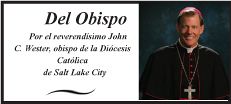As Christians, we are all strangers in a strange land, traveling to the kingdom
For some time now I have been trying to understand the reaction of so many Americans to our immigrants, documented and undocumented alike. Why are some so harsh, so vitriolic, when talking about immigration? Why so cruel in a country of immigrants? After contemplation, I realized that I may share some similar traits with those who rail against immigrants. If I look a little deeper, I find areas of my life where I am just as harsh toward others, just as negative or not accepting. The first step to immigration reform, I realized, is personal reform; examining our own actions and words, remembering moments when we too were immigrants in strange lands: alone, scared and uncertain about our futures, and how those moments shaped us. My first immigrant experience was in kindergarten. I remember very clearly the moment my mother left the room. The door shut and her comforting presence was suddenly gone. There I sat, alone in an unfamiliar room full of strangers. And then the teacher gave me a hug, graham crackers and milk – perhaps this wasn’t going to be so bad! That experience of kindness in what was to me a new land changed everything. It is in these everyday moments that God reveals his love, compassion and mercy, and gives us guidance. Jesus was appalled at his contemporaries’ attitude toward God’s children: how stereotypes, fear, selfishness and greed made it possible for people to ignore, harass, attack and push into the shadows those people different from themselves. In some ways, not much has changed 2,000 years later. As we contemplate modern questions about immigration reform, we need to ask ourselves if we are still, on a personal level, pushing people into a shadow existence. Are there people we ignore in our daily lives? With whom do we disagree and thus look down upon, whether for a point of principle or because of a tattoo or style of dress? Much of the immigration debate has been about building fences. But there are many other fences that already imprison us, the same fences Jesus stood against: stereotypes, fear, selfishness and greed. How do we, as individuals, fence people in? Who are we walling out of our own lives? As part of our personal journey to understand immigration, we must each ask what walls we put up between others and ourselves. Family unity is a vital component of immigration reform for the Catholic Church. To understand what this means on a deeper level, ask yourself how you work for the unity of your family, friends, parishioners and colleagues at work. Is unity as important as your own interests? My brother bishops and I have spoken often about the current immigration system creating a "shadow society," or a permanent underclass. Again, we can better comprehend what this means nationally if we first focus on our own lives and ask ourselves, who are the people we use or manipulate for our own ends without regard for their dignity? And how do we talk about people? Words are powerful. Like it or not, words hurt people and disparage them. We are all children of God, not swarms of insects, tsunamis that presage disaster or invasions that conjure up thoughts of gun-wielding terrorists bent on destruction. Ask yourself how you use words in your life. Do you hurt people, put them down, subtly ridicule them? Or do you use your words to affirm others? We are uniquely positioned to journey with today’s immigrants because we are immigrants ourselves. We are a pilgrim people. It is in our DNA as a country and it is part of what it means to be children of God, making our way to the fullness of the kingdom. Do we see ourselves as on a journey with others or rather as apart, having arrived, not in need of growth, better than others? Once we recognize that our own journey toward Christ calls us to be the ones dispensing hugs, graham crackers and milk to strangers, as my kindergarten teacher did years ago, we are better able to advocate for those whose own journeys bring them across our borders.
© Copyright 2024 The Diocese of Salt Lake City. All rights reserved.


Stay Connected With Us